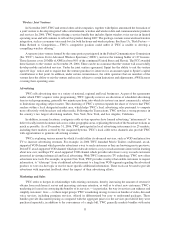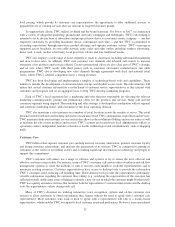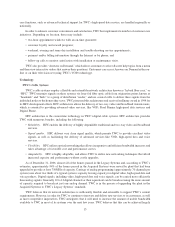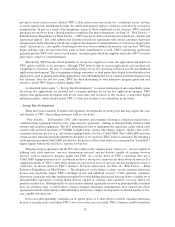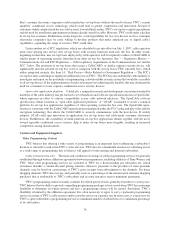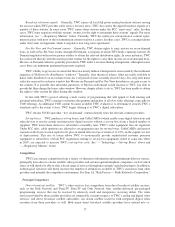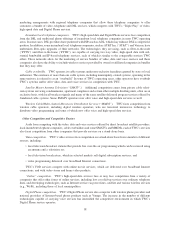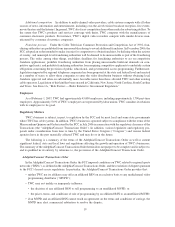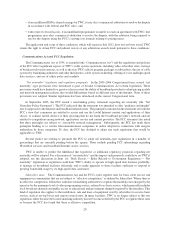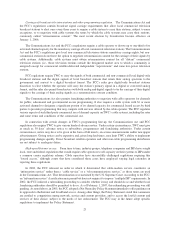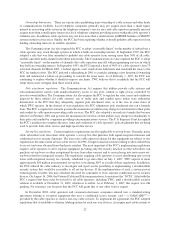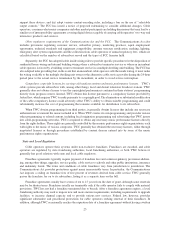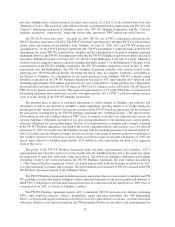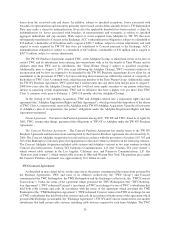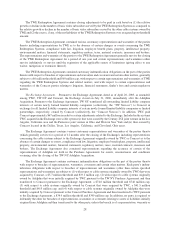Time Warner Cable 2006 Annual Report Download - page 26
Download and view the complete annual report
Please find page 26 of the 2006 Time Warner Cable annual report below. You can navigate through the pages in the report by either clicking on the pages listed below, or by using the keyword search tool below to find specific information within the annual report.Carriage of broadcast television stations and other programming regulation. The Communications Act and
the FCC’s regulations contain broadcast signal carriage requirements that allow local commercial television
broadcast stations to elect once every three years to require a cable system to carry their stations, subject to some
exceptions, or to negotiate with cable systems the terms by which the cable systems may carry their stations,
commonly called “retransmission consent.” The most recent election by broadcasters became effective on
January 1, 2006.
The Communications Act and the FCC’s regulations require a cable operator to devote up to one-third of its
activated channel capacity for the mandatory carriage of local commercial television stations. The Communications
Act and the FCC’s regulations give local non-commercial television stations mandatory carriage rights, but non-
commercial stations do not have the option to negotiate retransmission consent for the carriage of their signals by
cable systems. Additionally, cable systems must obtain retransmission consent for all “distant” commercial
television stations (i.e., those television stations outside the designated market area to which a community is
assigned) except for commercial satellite-delivered independent “superstations” and some low-power television
stations.
FCC regulations require TWC to carry the signals of both commercial and non-commercial local digital-only
broadcast stations and the digital signals of local broadcast stations that return their analog spectrum to the
government and convert to a digital broadcast format. The FCC’s rules give digital-only broadcast stations
discretion to elect whether the operator will carry the station’s primary signal in a digital or converted analog
format, and the rules also permit broadcasters with both analog and digital signals to tie the carriage of their digital
signals to the carriage of their analog signals as a retransmission consent condition.
The Communications Act also permits franchising authorities to negotiate with cable operators for channels
for public, educational and governmental access programming. It also requires a cable system with 36 or more
activated channels to designate a significant portion of its channel capacity for commercial leased access by third
parties to provide programming that may compete with services offered by the cable operator. The FCC regulates
various aspects of such third party commercial use of channel capacity on TWC’s cable systems, including the rates
and some terms and conditions of the commercial use.
In connection with certain changes in TWC’s programming line-up, the Communications Act and FCC
regulations also require TWC to give various kinds of advance notice. Under certain circumstances, TWC must give
as much as 30 days’ advance notice to subscribers, programmers and franchising authorities. Under certain
circumstances, notice may have to be given in the form of bill inserts, on-screen announcements and/or newspaper
advertisements. Giving notice can be expensive and, given long lead times, may limit TWC’s ability to implement
programming changes quickly. Direct broadcast satellite operators and other non-cable programming distributors
are not subject to analogous duties.
High-speed Internet access. From time to time, industry groups, telephone companies and ISPs have sought
local, state and federal regulations that would require cable operators to sell capacity on their systems to ISPs under
a common carrier regulatory scheme. Cable operators have successfully challenged regulations requiring this
“forced access,” although courts that have considered these cases have employed varying legal rationales in
rejecting these regulations.
In 2002, the FCC released an order in which it determined that cable-modem service constitutes an
“information service” rather than a “cable service” or a “telecommunications service,” as those terms are used
in the Communications Act. That determination was sustained by the U.S. Supreme Court. According to the FCC,
an “information service” classification may permit but does not require it to impose “multiple ISP” requirements. In
2002, the FCC initiated a rulemaking proceeding to consider whether it may and should do so and whether local
franchising authorities should be permitted to do so. As of February 1, 2007, this rulemaking proceeding was still
pending. As noted above, in 2005, the FCC adopted a Net Neutrality Policy Statement intended to offer guidance on
its approach to the Internet and broadband access. Among other things, the Policy Statement stated that consumers
are entitled to competition among network, service and content providers, and to access the lawful content and
services of their choice, subject to the needs of law enforcement. The FCC may in the future adopt specific
regulations to implement the Policy Statement.
21


